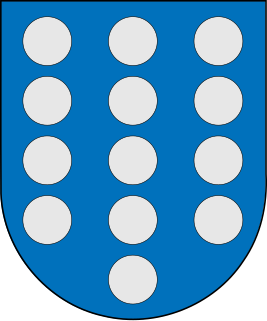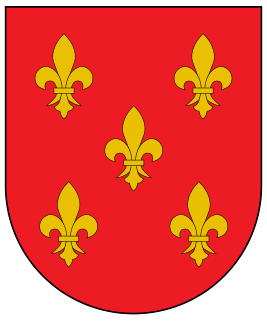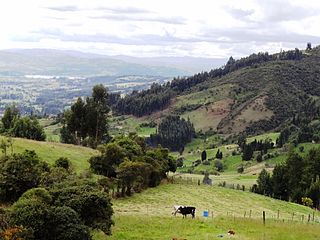See also
- Juana de la Concepción (Juana de Maldonado y Paz, 1598–1566), Guatemalan nun and poet
Juan (de) Maldonado may refer to:

Conquistadors or conquistadores were the invaders, knights, soldiers, and explorers of the Spanish and the Portuguese Empires. During the Age of Discovery, conquistadors sailed beyond Europe to the Americas, Oceania, Africa, and Asia, colonizing and exploiting territory and opening trade routes. They brought colonialism to much of the world for Spain and Portugal in the 16th, 17th, and 18th centuries.

Sebastián de Belalcázar was a Spanish conquistador. De Belalcázar, also written as de Benalcázar, is known as the founder of important early colonial cities in the northwestern part of South America; Quito in 1534 and Cali, Pasto and Popayán in 1537. De Belalcázar led expeditions in present-day Ecuador and Colombia and died of natural causes after being sentenced to death in Cartagena, at the Caribbean coast in 1551.

Gonzalo Jiménez de Quesada y Rivera, also spelled as Ximénez and De Quezada, was a Spanish explorer and conquistador in northern South America, territories currently known as Colombia. He explored the territory named by him New Kingdom of Granada, and founded its capital, Santafé de Bogotá. As a well-educated lawyer he was one of the intellectuals of the Spanish conquest. He was an effective organizer and leader, designed the first legislation for the government of the area, and was its historian. He was governor of Cartagena between 1556 and 1557, and after 1569 he undertook explorations toward the east, searching for the elusive El Dorado. The campaign didn't succeed and Jiménez then returned to New Granada in 1573. He has been suggested as a possible model for Cervantes' Don Quixote.
Juan is a given name, the Spanish and Manx versions of John. It is very common in Spain and in other Spanish-speaking communities around the world and in the Philippines, and also in the Isle of Man. In Spanish, the diminutive form is Juanito, with feminine form Juana, and feminine diminutive Juanita.
José is a predominantly Spanish and Portuguese form of the given name Joseph. While spelled alike, this name is pronounced differently in each language: Spanish [xoˈse]; Portuguese [ʒuˈzɛ].
Sandoval is a habitational surname of Spanish origin. It primarily originates from Sandoval de la Reina, Spain, earlier called Sannoval, which is a blend word of Latin saltus and Latin novalis.
Vergara may refer to:

Velázquez, also Velazquez, Velásquez or Velasquez, is a surname from Spain. It is a patronymic name, meaning "son of Velasco"

Pedro de Heredia was a Spanish conquistador, founder of the city of Cartagena de Indias and explorer of the northern coast and the interior of present-day Colombia.
Vázquez, in non-Spanish-speaking countries often spelled as Vazquez or Vasquez, is an originally Galician surname, in use not only in Galicia but all over the Spanish-speaking world.

The New Kingdom of Granada, or Kingdom of the New Granada, was the name given to a group of 16th-century Spanish colonial provinces in northern South America governed by the president of the Audiencia of Santa Fe, an area corresponding mainly to modern-day Colombia. The conquistadors originally organized it as a province with a Royal Audience within the Viceroyalty of Peru. The audiencia was established by the crown in 1549. Ultimately the kingdom became the Viceroyalty of New Granada first in 1717 and permanently in 1739. After several attempts to set up independent states in the 1810s, the kingdom and the viceroyalty ceased to exist altogether in 1819 with the establishment of the United Provinces of New Granada.

Maldonado is a Spanish surname. Notable people with the surname include:
Avendaño is a Spanish surname. It is believed to have originated in Galicia, then passed to the Basque Country, and later spread to other areas of Spain and to Latin America.
Lugo is a Spanish surname named after the city of Lugo in Galicia, Spain.
Gonzalo is a Spanish masculine given name.

López is a surname of Spanish origin. It was originally a patronymic, meaning "Son of Lope", Lope itself being a Spanish given name deriving from Latin lupus, meaning "wolf". The surname is first attested in Old Castile in the heart of Spain, where the name originated in Visigothic times; however, the name is not of Germanic origin. Its Portuguese and Galician equivalent is Lopes, its Italian equivalent is Lupo, its French equivalent is Loup, its Romanian equivalent is Lupu or Lupescu and its Catalan and Valencian equivalent is Llopis.

Tundama or Saymoso was a cacique of the Muisca Confederation, a loose confederation of different rulers of the Muisca who inhabited the central highlands of the Colombian Andes. The city of Tundama, currently known as Duitama and part of the Tundama Province, Boyacá, were named after the cacique. Tundama ruled over the northernmost territories of the Muisca, submitted last by the Spanish conquistadores.
Baltasar Maldonado, also written as Baltazar Maldonado, was a Spanish conquistador who first served under Gonzalo Jiménez de Quesada, and later in the army of Hernán Pérez de Quesada in the Spanish conquest of the Muisca.